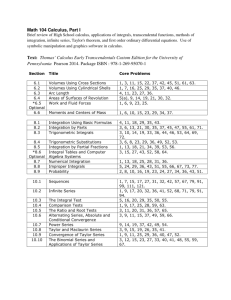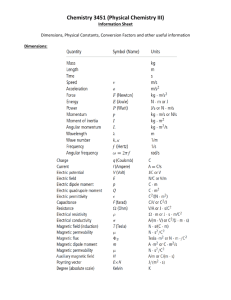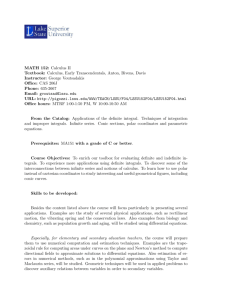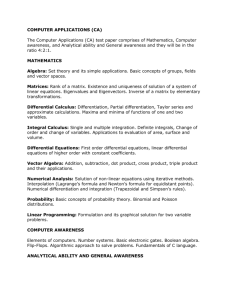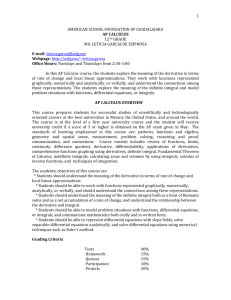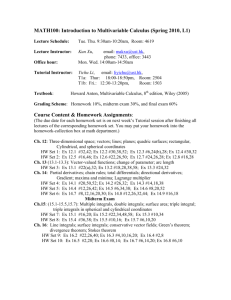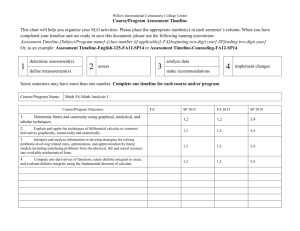Semester 4 syllabus
advertisement
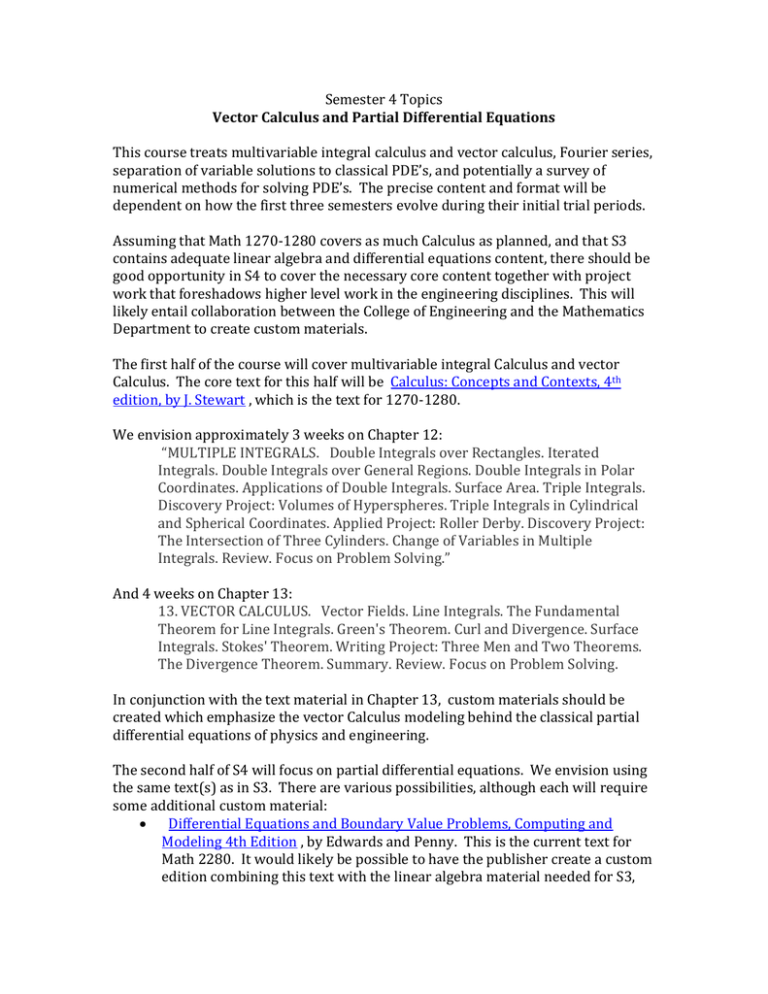
Semester 4 Topics Vector Calculus and Partial Differential Equations This course treats multivariable integral calculus and vector calculus, Fourier series, separation of variable solutions to classical PDE’s, and potentially a survey of numerical methods for solving PDE’s. The precise content and format will be dependent on how the first three semesters evolve during their initial trial periods. Assuming that Math 1270-1280 covers as much Calculus as planned, and that S3 contains adequate linear algebra and differential equations content, there should be good opportunity in S4 to cover the necessary core content together with project work that foreshadows higher level work in the engineering disciplines. This will likely entail collaboration between the College of Engineering and the Mathematics Department to create custom materials. The first half of the course will cover multivariable integral Calculus and vector Calculus. The core text for this half will be Calculus: Concepts and Contexts, 4th edition, by J. Stewart , which is the text for 1270-1280. We envision approximately 3 weeks on Chapter 12: “MULTIPLE INTEGRALS. Double Integrals over Rectangles. Iterated Integrals. Double Integrals over General Regions. Double Integrals in Polar Coordinates. Applications of Double Integrals. Surface Area. Triple Integrals. Discovery Project: Volumes of Hyperspheres. Triple Integrals in Cylindrical and Spherical Coordinates. Applied Project: Roller Derby. Discovery Project: The Intersection of Three Cylinders. Change of Variables in Multiple Integrals. Review. Focus on Problem Solving.” And 4 weeks on Chapter 13: 13. VECTOR CALCULUS. Vector Fields. Line Integrals. The Fundamental Theorem for Line Integrals. Green's Theorem. Curl and Divergence. Surface Integrals. Stokes' Theorem. Writing Project: Three Men and Two Theorems. The Divergence Theorem. Summary. Review. Focus on Problem Solving. In conjunction with the text material in Chapter 13, custom materials should be created which emphasize the vector Calculus modeling behind the classical partial differential equations of physics and engineering. The second half of S4 will focus on partial differential equations. We envision using the same text(s) as in S3. There are various possibilities, although each will require some additional custom material: Differential Equations and Boundary Value Problems, Computing and Modeling 4th Edition , by Edwards and Penny. This is the current text for Math 2280. It would likely be possible to have the publisher create a custom edition combining this text with the linear algebra material needed for S3, such as exists in our current Math 2250 text also written by EdwardsPenney. In this way two books would suffice for the two year sequence. Elementary Differential Equations and Boundary Value Problems 9th Edition by Boyce and DiPrima. This text would require linear algebra supplement for S3. Differential Equations with Boundary Value Problems 2nd Edition by Polking, Boggess, and Arnold. This text would require linear algebra supplement for S3. For example, using the Edwards and Penney text, the core material would include about 3 weeks to cover Chapter 9: “Periodic Functions and Trigonometric Series. General Fourier Series and Convergence. Even-Odd Functions and Termwise Differentiation. Applications of Fourier Series. Heat Conduction and Separation of Variables. Vibrating Strings and the One-Dimensional Wave Equation. Steady-State Temperature and Laplace's Equation.” The current Math 3150 (with a different text) uses the remaining 60% of that course to partially cover elements of the Chapter 8, 10 material, together with the Fourier transform: “8. Power Series Methods. Introduction and Review of Power Series. Series Solutions Near Ordinary Points. Regular Singular Points. Method of Frobenius: The Exceptional Cases. Bessel's Equation. Applications of Bessel Functions.” “10. Eigenvalues and Boundary Value Problems. Sturm-Liouville Problems and Eigenfunction Expansions. Applications of Eigenfunction Series. Steady Periodic Solutions and Natural Frequencies. Applications of Bessel Functions. Higher-Dimensional Phenomena.” In the Mathematics Department we feel that it might be appropriate to deemphasize series solutions to differential equations, including Bessel’s functions and their applications, and to also de-emphasize the further applications of separation of variables in Chapter 10. We expect there may be greater utility in creating custom material and matlab projects related to numerical methods in partial differential equations. Topics would include the discrete and fast Fourier transforms, and finite difference and finite element modeling in partial differential equations. Exactly which topics are most appropriate for this half of semester 4 would need to be worked out with the College of Engineering. Ideally the topic and project choice will be a good capstone, and effectively foreshadow the higher level work that the COE students will be moving into upon completion of this sequence.
